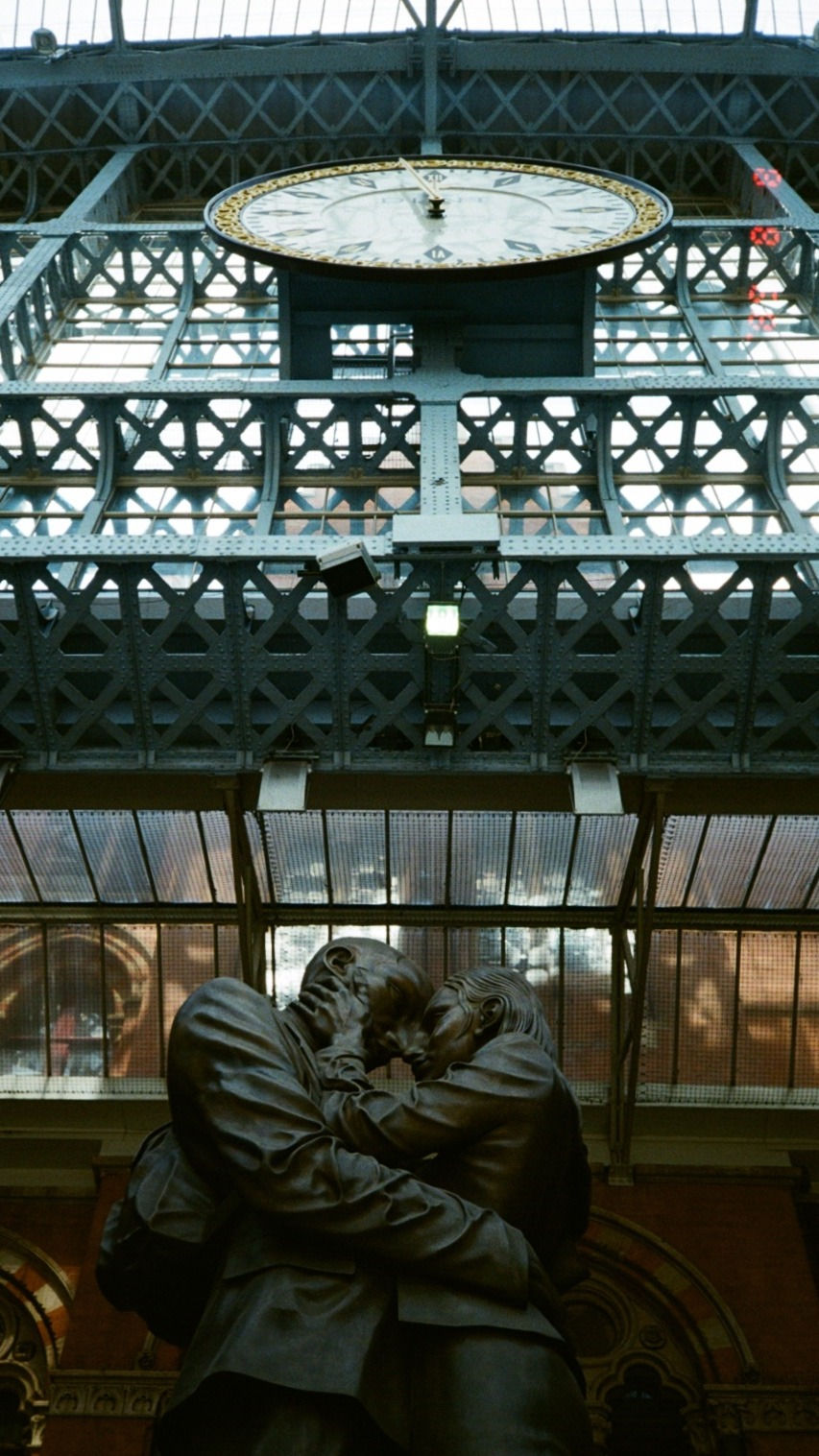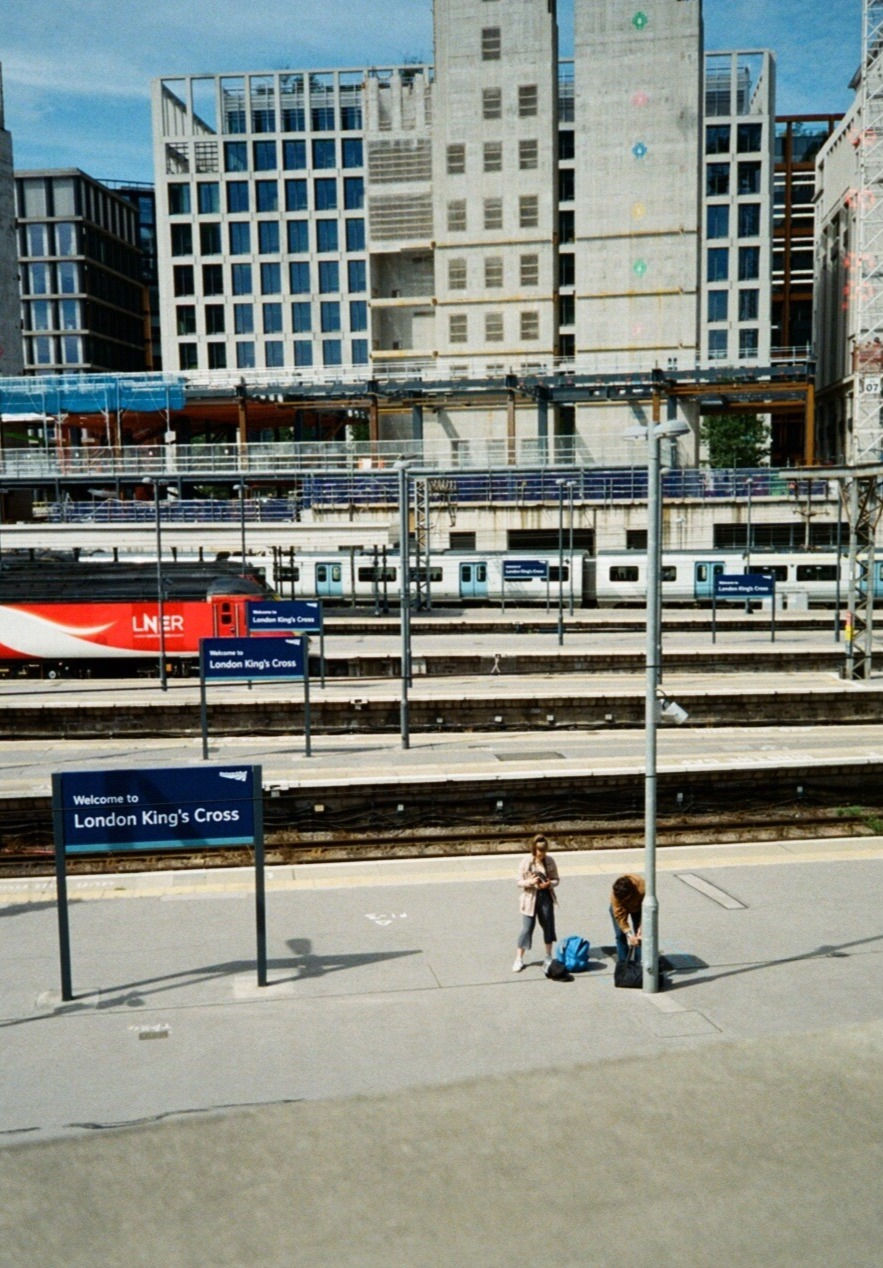Entry #5: Kings Cross
- Anna McNutt

- Aug 19, 2019
- 8 min read
Updated: Jan 15, 2025
August 19, 2019
Kings Cross. Or is it St. Pancras?
For anyone unfamiliar with London, these two stations can be confusing, but essentially, what you need to know is that one station handles national rail services, and the other is a gateway to Europe. Still confused? Just remember: Kings Cross is where Harry Potter ran headlong into a brick wall and disappeared, and St. Pancras is the one with the fancy clock tower, soaring glass ceilings and the Eurostar.
Once a rural patch of mud, this area was a hive of industrial activity, moving grain, milk, and coal during the 19th century. By 1939, the tracks were repurposed to carry troops and supplies for war. In the 1960s, beer was stored in St. Pancras’s undercroft, and in the late 80s, warehouses surrounding Kings Cross became the epicenter of rave culture.

By 1996, construction on the Channel Tunnel began, linking London directly to the continent. Today, these two stations stand side-by-side, serving millions of passengers, with St. Pancras, the ninth busiest station in Britain, just ahead of Kings Cross at tenth (Waterloo, of course, is untouchable in the first place.)
This area is a story of transformation: from quiet beginnings to industrial grit, from a haven for rave culture to a sleek, modern hub. Kings Cross and St. Pancras are two distinct characters, each with a past, standing together as a bridge between history and progress.
What I love most here is The Meeting Place by Paul Day. When you return to London from, say, Paris or Brussels and step off Platform 5, you’re greeted by a massive nine-meter statue of a man and woman embracing, their foreheads just lightly touching. Above them, a giant clock looms.
Though the piece received criticism - some artists call it too sentimental, even kitsch - in 2011, Lonely Planet called the site, ‘The World’s Most Romantic Spot,’ and for me, it’s the perfect welcome back. There’s something comforting about it, this towering display of intimacy in the middle of a station so vast, so busy. It’s a moment of stillness, caught in bronze.

Unfortunately, in 2018, artist Tracey Emin thought it would be a great idea to slap the words: I want my time with you. Beneath the statue. In bright neon pink. Italicized - for extra flair. If the lovers were too sentimental then, their love was definitely vomit-worthy now.
In truth, if there are to be any words underneath such a poignant image, they should be: and time stops. Because that’s what love feels like - a suspension in time.
Maybe it’s because the bronze lovers are locked in an unbroken embrace, impervious to time, but I find myself in awe of them. Unlike the real-life humans, all flesh and slobber, who cling to each other outside the Departures gate

We all know that sting of arriving somewhere, especially to your home country, with no one waiting for you. It’s a real pinch to the heart. At first, you think nothing of it. You saunter out, rolling your suitcase out with purpose, mentally mapping your journey ahead, when suddenly, you look up and there they are: a parade of couples. At the exit, on the platform, inside the tube, kissing and hugging each step of the way. Their relief at being reunited is palpable, their excitement for what’s next - dinner, sex, whatever - practically radiating off them. Their love is infectious, but you are on antibiotics.
Full disclosure: I have always wanted to be surprised after a trip by an old flame with fire in their heart. When you’re knee-deep in unrequited love, grand, spontaneous declarations are the pacifier. Further disclosure: I am recovering from a breakup.
Cue Your Love by Haerts.
Time stops when you’re high on love. I mean, the clock is still ticking, but you feel infinite. Like that statue. Frozen. In love. Forever. The clamor of the world ceases to exist.
Could it be, then, that the root of my envy toward these happy couples has less to do with them and more with me? That, upon arriving in another country, the brutal truth is laid bare: I’m not arriving for myself. And when was the last time you traveled somewhere, just for youself? At what point in life do you silence the clamor of the world completely? At what point do you depart from it entirely?
The brief for creating The Meeting Place was to build something romantic and democratic, an image as iconic as the Statue of Liberty. Paul Day wanted to explore different kinds of meetings - especially the joy and uncertainty of reuniting after time apart. And so, the statue stands as a beacon of hope, a couple entranced in reunion and love.
But what’s most striking about The Meeting Place is that the lovers are not alone. Encircling the base of the statue are other figures, etched in relief: a man slumped at the edge of his seat in sandals, chin resting on his hand, waiting for his train; an older man snoozing on his shoulder. Nearby, a woman lifts her leg as her partner leans in for a kiss, her skirt subtly raised. There’s a mother dragging her child through the station’s chaos, and a little boy waving goodbye to his father boarding a train.
The statue buzzes with energy, capturing those fleeting, emotional moments that define human connection. Yet beneath it all, an unspoken tension lingers. The underlying question that all separation brings: Is this forever?

According to the UK’s leading dating expert, Hayley Quinn, the way we approach love is a bit…odd. “You get to go home every night and you get to put your head on the pillow, and you don't have to think about your needs, your wants, your past and actually all the stuff that's really, probably, stopping you from becoming happy.”
I’ll admit, after my relationship fell apart, I was ready to abandon my life in London without second thought. But to what end?
For me, simply moving to London had been an act of faith. I had no clue why I was doing it.
At first, I was fascinated by London’s energy. It pulsed with promise, possibility. Then, I became critical of it. Like trying to fit a square peg into a round hole. It was like going through a 12-step program, a dysfunctional relationship with the city. And though I have yet to experience a full-on spiritual awakening in London, I can say this: I accept my place in it. A year ago, I stepped off the train at St. Pancras and thought, What am I - and this backpacking hippie next to me - doing here? Now, I walk by Kings Cross and think: We’re all stuck here, and it’s wonderful.

Maria*, a friend of mine, came to London from Mexico with a fierce desire to be part of the madness that is London. In her first year, she struggled to find her footing and would often visit Kings Cross. Whenever she felt low, she’d grab a bite to eat and sit, watching the world move around her. It gave her a sense of belonging, even when her own life felt stagnant. As if seeing people - busy people - hurry to their destinations made her feel like she had made it. Indeed, you may not physically be going anywhere in your own life, but the potential to move forward and grow is exciting.
Big, small, tall, short! A group of friends spill chips and laughter onto the pavement, a family in matching jackets shepherd their child through the rush, a couple hold hands as though the crowd doesn't exist, a lone walker adjusts the settings of his camera. Two women, beers in hand, hide from the midday sun, teenage girls pose for a selfie in front of an Underground sign, an older man schleps his wife’s luggage to get a cab...you see, when you live in London, you forget how many people dream of just coming to visit it.
On average, 30 million tourists flood London each year. With the recent political atmosphere, the number of visitors to the UK has declined by 3% from 39.2 million in 2017 and 37.9 million in 2018. Experts predict a rebound soon, but I’m not so sure. Between Theresa May’s teary resignation and Boris Johnson’s cartoonish comparisons to Trump, there’s a lingering uncertainty. Still, one truth remains: London thrives on its diversity, its churn of arrivals and departures, its constant reinvention.
And perhaps that’s why we’re all running. Enveloped in this city’s energy, we carry the quiet hope that if we just keep going, fulfillment will eventually catch up with us. What astonishes me most is how almost everyone in one way or another is looking for that rush – that sense of relief you get when you’re no longer lonely in a crowded room. It’s no wonder we cling to distractions: work, relationships, obligations. Anything to avoid sitting still with ourselves.
In April, I decided to take a trip to Costa Rica. It was a rather impulsive ticket purchase, and I wasn’t really in the position to take time off work, but London was becoming suffocating – everything was going nowhere. I barely told anyone - just my parents a week before - and didn’t dwell much on the decision before going.
When I found myself on the plane, looking out the window, I didn’t feel nervous. The flight attendant’s voice echoed over the intercom, announcing takeoff. The plane began to move, and then, it hit me. Like a tidal wave.
As the plane began its ascent, my heart started to drop. I cried. With relief. For the decision to leave London, even if it was only for a holiday, was my decision alone. No input from friends, family, or a partner. I had done something just for myself.
That’s what freedom feels like.

Soon after, I realized that I was altogether wrong. I did feel freedom, for a brief moment, and then I came back ten days later with the same problems waiting for me at my doorstep.
We can run from family, we can run from friends, we can run from love. But what we can never outrun is ourselves - not even to a beautiful place like Central America. Since then, I’ve developed an insatiable hunger to understand myself better. I’ve come to see that the quest to finding yourself never stops. It’s not about escaping your reality; it’s about facing it. Regardless of what country you are in, what line of work you do, or what romantic adventure you embark on.
Or as Quinn expands, “When we deal with ourselves and we’re not running away from it, when you don’t have anything to prove in order to feel alive, in order to feel like you exist, when you can just be... I think that’s real love.”

Staying in London has become a conscious choice for me, one I make almost every day. If you’ve ever moved here as an act of faith, you’ll understand. London isn’t particularly romantic - it’s manic, isolating, and relentless. Romanticizing Where I Live isn’t a project to glorify London; it’s an invitation to reflect on why we choose to stay.
Though I can’t say I look forward to the row of couples greeting me at the next terminal, I can’t deny the abundance of love in this city. After all, if 30 million people visit London every year, surely there’s something worth fighting for here.
**Information sourced from the BBC, St. Pancras International and Hayley Quinn's Ted Talk.



Comments